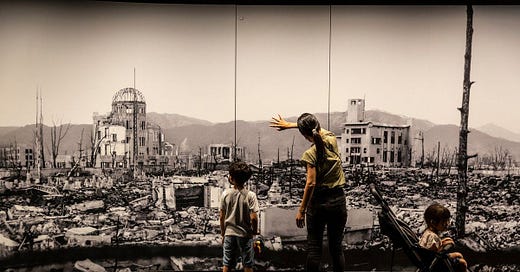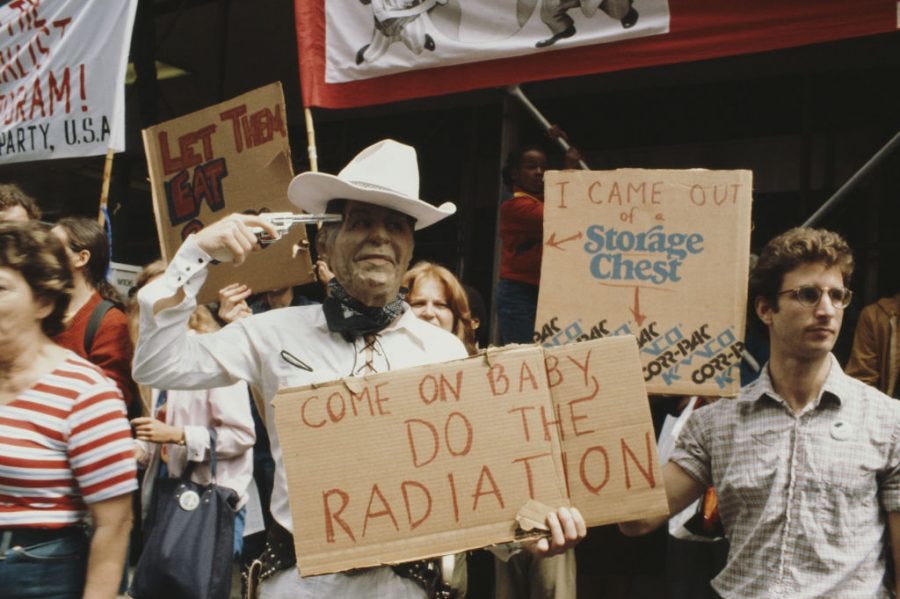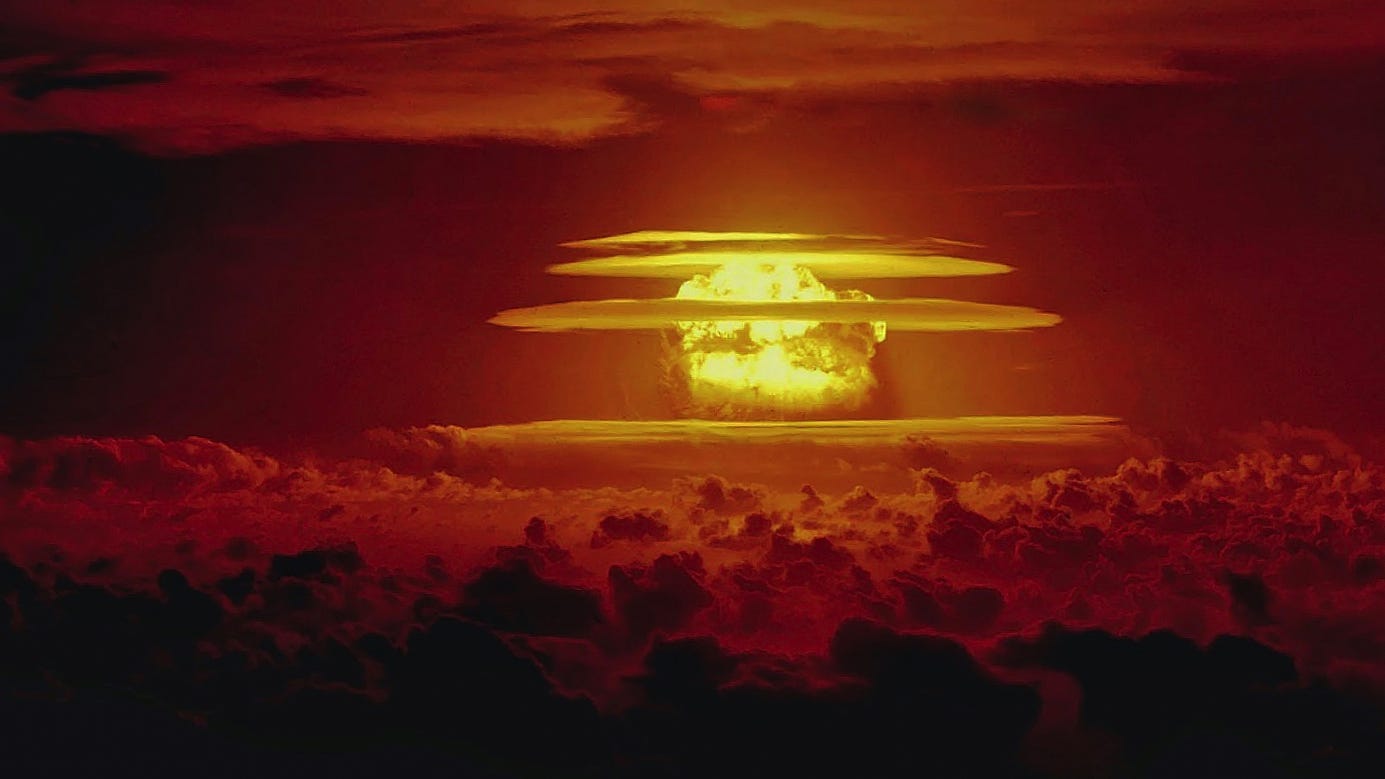
As India and Pakistan shoot down each other’s planes somewhere over the horizon, I can see but one small, private, cause for celebration. The world has again proved my professors wrong. As an undergraduate I had occasion to sample a few of the prevailing doctrines of international war and security, taking classes on terrorism (taught by a consultant for the US Air Force, and thus a man not without experience of terrorists himself), security studies, and the history of nuclear weapons.
In the latter class I was told that the bomb had made the world safer. The doctrine of nuclear stalemate is, indeed, so simple a child could understand it. The theory says: strike me first if you like, I will retain enough nuclear weapons to inflict unacceptable damage — say 20 to 30 million of your citizens — in a second strike. Given the inevitability of their mutual destruction, two nuclear-armed countries will never go to war. Seventy years of nuclear peace since Nagasaki — a verifiable fact — gives this theory its truth.
But the facts here bothered me, even as a student. I will grant you that since 1945 nuclear weapons have, as yet, not been detonated in war. But even a cursory survey of twentieth-century history will demonstrate that this was not due to any strategic doctrine or political restraint, but simply to luck. Or, if not brute chance, to individuals whose judgement overruled the nuclear protocols they had sworn to uphold. Vasily Arkhipov, who saved the world in 1962 by refusing to launch his submarine’s nuclear payload, was lambasted for breaking protocol. “It would have been better,” his superiors told him, “if you’d gone down with your ship.”
Nuclear weapons were created to be used, and sure enough the United States debated using them in North Korea (1951), Dien Bien Phu (1954), the Suez Crisis (1956), the Taiwan Strait Crisis (1958), the Cuban Missile Crisis (1962), North Korea (1969) and, for symmetry’s sake, North Korea again (2017). On several occasions they came horribly close. This is to say nothing of innumerable nuclear accidents, any one of which could have triggered an automatic first-strike, or a mere regional catastrophe like Chernobyl. How close has the world come to accidental nuclear detonation? On more than one occasion, notes the Union of Concerned Scientists, “high explosives surrounding [a] warhead’s plutonium center detonated without triggering a nuclear chain reaction, but contaminated the surrounding area with radioactive material.” That bloody close.
At the height of the Cold War, false alarms were frequent and could have any number of causes. A fried computer chip. Light reflecting off clouds. A few geese in flight. At some point, each of these phenomena convinced nuclear personnel in either the United States or Soviet Union that their respective nations were under imminent attack. From November 1979 to June 1980—a period of just eight months—the United States experienced four separate false alarms. At least one sent interceptor planes and President Carter’s own 'doomsday plane’ roaring into the sky.
State officials were keen to reassure the president that “human safeguards” ensured that “no chance that any irretrievable actions would be taken” as a result of a faulty computer reading. I will concede that those “human safeguards” indeed did their job. But over fifty years, faulty equipment, anomalous natural phenomena, and human error triggered nuclear close-calls almost at random. The window for nuclear retaliation is no more than fifteen minutes, and several false alarms took much longer to clear up. On 3 June, 1980, defense officials needed half an hour to decide that more than 2,000 missiles were not, in fact, spiralling through the void towards American airspace.
This particular incident was triggered by the failure of a 46-cent computer chip. The chip, said the Pentagon, “simply wore out.” Which gods can we thank that this chip — one of millions — did not burn out at a more fraught period? Under Kennedy in the throes of the Cuban Missile Crisis, or under Nixon nightly drinking himself to a stupor, there would not have been half an hour to convene.
So you do not get to argue that nuclear weapons have made the world safer. On dozens of occasions, the jets have been scrambled, the targets selected, the launchkeys primed. Just one of these moments could have initiated actual nuclear war, and it is solely due to an unfathomable amount of good luck that war was averted. That sheer accident — not protocol, strategy, or diplomacy — precluded nuclear war time and time again might seem an unscientific conclusion, an unverifiable assertion a sound scholar must dismiss. The political scientist is a credulous, pattern-seeking creature. If he is taught that MAD brought seventy years of great power peace — concomitant, he is told, with a general decline in interstate war — he will readily believe that the nature of nuclear weapons itself causes peace.
This is rather like a cosmologist dismissing the anthropic principle because the odds of a universe appearing with all its physical constants exquisitely calibrated for the emergence of intelligent life are just a bit too high. We happen to live in the timeline where nuclear war did not break out, because of course we do: in all the other timelines we are all fucking dead. This is not hard to understand. It takes a special type of superstition to believe that this slew of shoddy close-calls attests to some quality inherent in nuclear weapons to stave off war. Only the sort of base superstition in which political scientists seem to specialise could read the history of nuclear near-disaster as anything but a horror story of phenomenal, undeserved good luck.
Here is the simple truth: as long as nuclear weapons exist, they exist to be used. This used to be understood by the general public, which is why protest movements stridently campaigned for nuclear abolition across Europe and North America for forty years. This peace movement, once capable of mobilising a million people to the streets of New York, was utterly destroyed alongside the rest of the organised Western left. Today the anti-nuclear movement has not merely been abandoned: who today even remembers that it existed? Against the bomb, Japan’s hibakusha are all that is left. Once scorned and humiliated, these withered old activists are now politely celebrated and politely ignored. They have lived to see their long, lonely fight for peace repudiated on every front. Now they can only watch as the same holocaust that met them in Hiroshima descends on Palestinians. “In Gaza, children in blood are being held,” said Toshiyuki Mimaki upon winning the Nobel Peace Prize, “It’s like in Japan 80 years ago.”
Those seeking an explanation of an impending World War III would do well to start here. Nuclear weapons are the ultimate expression of militarism. The maintenance of these weapons by the world’s richest nations, notwithstanding international law or public pressure, has been a fatal blow to world peace. Far from forestalling war, as conventional wisdom holds, nuclear weapons have made war an eternal threat. Even now doomsday bombs are pointed at the sky. Next to what they portend, conventional war looks paltry. Say nuclear and you say BAE, Boeing, Northrop, and Lockheed Martin — the backbone of the military industrial complex. Say nuclear and you understand why the United States, Russia, and Israel can wage war so freely, confident in being able to fall back on the nuclear option.
The Cold War years were known for their special brand of nuclear paranoia. Bomb drills under the desk. Bunkers in the backyard. Visions of death pealing through the collective unconscious. If this paranoia has largely disappeared, the threat that engendered it has not. Unless popular revulsion at the very existence of nuclear weapons returns in force, we will have to take solace in the fact that future humans, mouldy with radiation sickness, scrabbling with the cockroaches in some McCarthyean nightmare, will lack even the measure of peace with which to indict us.






Such a basic notion that seems to have faded into our collective memory hole. Part of me thinks the ban of atomic tests helped make us forget the true horror of nuclear war.